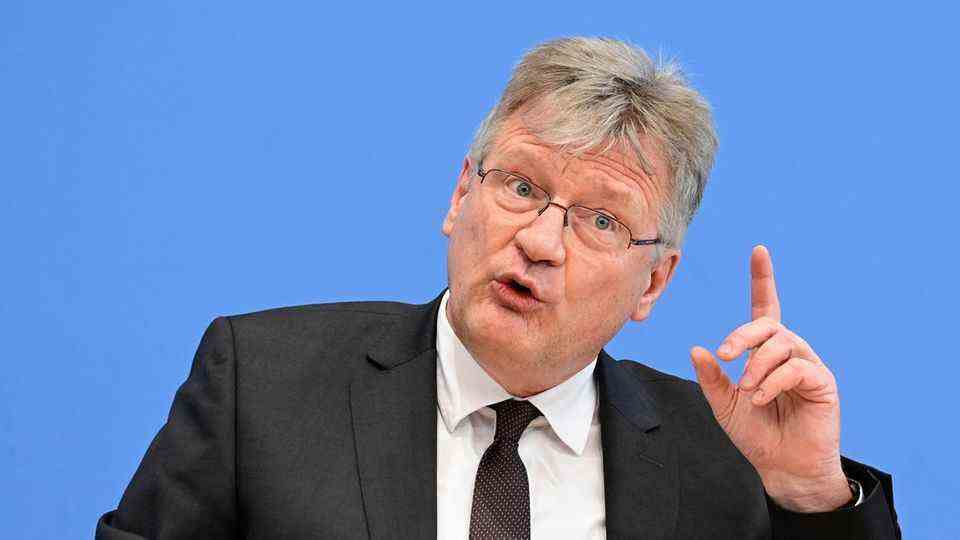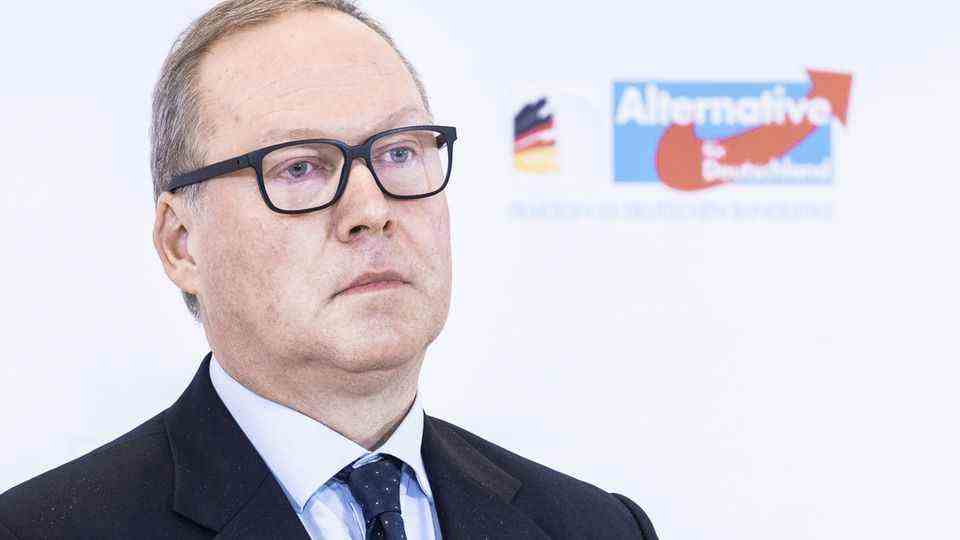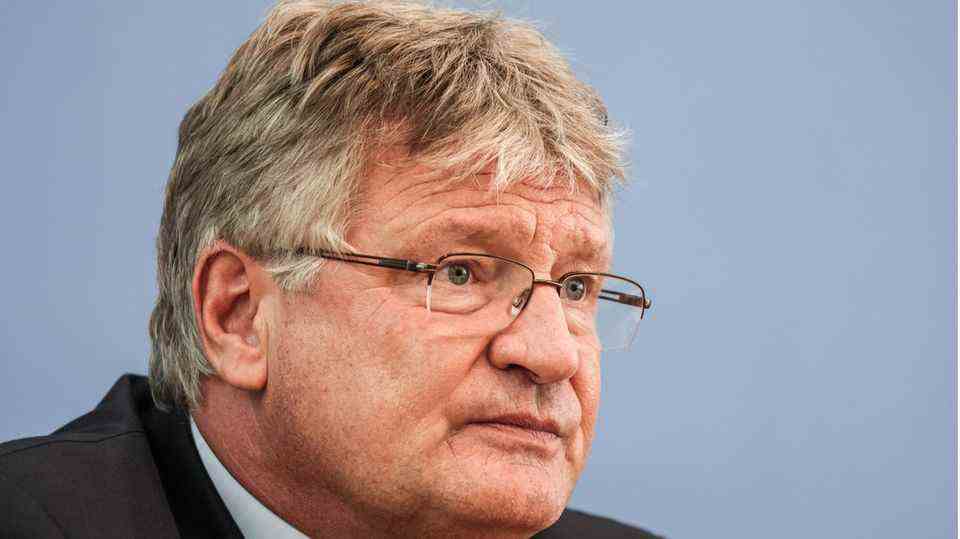Jörg Meuthen wants to have recognized the true core of the AfD and is turning his back on the right-wing party. No further questions, except: Why now? And why so?
Since Jörg Meuthen noticed that he had been the chairman of an increasingly radical right-wing party for six and a half years, there has hardly been a day on which he hasn’t sharply criticized the, well, increasingly radical right-wing party.
“I clearly see totalitarian echoes there,” he said on Friday.
“It is particularly shocking for me (…) also verbally articulated contempt for those who think differently”, he explained on Saturday.
“I’ve been met with more hate from the party than from Antifa,” he complained on Mondayhe will “definitely no longer vote for the AfD”.
“Ashamed of others had reached an all-time high,” he etched on Tuesday.
But Meuthen’s voice will not be silenced, as he assures that he wants to remain an MEP after retiring from the party and presidency. And now start “something new”..
He believes he has identified a “gap” in the political spectrum between “a CDU that has slid to the left and an AfD that has slid to the right”. Is Meuthen founding a new party, helping to set one up? He didn’t want to commit to that, but: “Something new will come.”
No further questions, except: What is all this about?
The retreat
If you ask Tino Chrupalla, his previous co-party leader, Meuthen has with his withdrawal “the split in the AfD ended”. Chrupalla will now “bring the party together, keep it together”. Until the next federal party conference, which is expected to decide on a new leader in May, Chrupalla is likely to lead the party alone for the time being.
Apparently that does the trick initial resistance and suspicion. The rifts between the rival camps in the AfD are deep – and Meuthen’s premature departure could exacerbate the situation rather than defuse it.
His withdrawal came as no surprise. As early as October, Meuthen announced that he would no longer run for the presidency. It was a withdrawal in installments from the start. It is therefore remarkable how Meuthen now justifies this.
He spoke of defeat in a power struggle with the formally dissolved right-wing extremist “wing” over the direction of the party. The economist, who has demonstratively championed the fight against the ultra-right in his own ranks, has repeatedly called for a more moderate course over the past two years.
“His understanding of this party was to only go so far to the right that it achieved so much electoral success in the West that it could become an ally between the right and the far right,” said political scientist Hajo Funke.
As much as Meuthen supported the right-wing extremists in his early years and thus moved into the center of the party, he later came to the conviction that the party had “fallen into a right-wing extremist aberration”.
The economics professor from Baden-Württemberg had long sought to be close to the radical forces, the “wing” once supported, by appearing as a speaker at the annual meetings. Until he openly opposed him.
Camps
Meuthen used a lot of ambition to fend off an observation of the AfD by the Office for the Protection of the Constitution. In spring 2020, the Federal Office classified the AfD “wing” as “safe right-wing extremist”. Meuthen pleaded for its separation. And the fronts between the party camps hardened.
At the end of 2020, he settled accounts with right-wing provocateurs at a party congress in Kalkar; opposition to him grew. At the Dresden party conference in April 2021, the shift to the right could no longer be overlooked.
The Thuringian head of state Björn Höcke, who usually prefers to play in the background, sought the limelight and got the hall behind him. The Party Congress decided on a Corona resolution in the style of the “lateral thinker” movement and included the demand for Germany’s exit from the EU in the election program – despite Meuthen’s urgent warning.
This meant that Meuthen’s loss of importance could no longer be overlooked. He lost a lot of support, especially in the East German AfD state associations and the “wing” camp. He was no longer invited to the state election campaign in Saxony-Anhalt in 2021.
Meuthen was unable to push through his preferred candidate for the top candidate for the Bundestag elections. Instead, the AfD members chose Alice Weidel and Tino Chrupalla as the top duo, which are considered close to the “wing”. A victory for the right edge, a defeat for Meuthen.
The Admission
Jörg Meuthen had long since lost the power struggle in the AfD. He didn’t want to be taken away from a sharp farewell reckoning.
In his farewell message, he described the course of the party in clear terms: the AfD is “very far to the right,” and parts of it are “not grounded in the free democratic basic order.”
In order to avoid any misunderstandings, he immediately listed those responsible, although the AfD also radicalized under his leadership: Co-Chairman Tino Chrupalla, parliamentary group leader Weidel, the honorary chairman Alexander Gauland as well as the right-wing agitator Höcke and AfD party leader Stephan Brandner. They all “worked a long time” so that he was finally gone.
Meuthen’s reckoning is therefore also an admission. He concedes that the far-right edge of the AfD is now calling the shots. And he finally no longer has any influence.
“The moderate forces in this party, which had a national-conservative party in mind, are becoming increasingly insignificant,” said political scientist Ulricht Eith MDR. The image of the party is determined by forces that are “very far to the right”.
This picture recently showed the nomination of Max Otte as an AfD candidate for the office of Federal President, the most recent rift in the camp struggle. Co-boss Chrupalla is said to have nominated the CDU politician who Meuthen once called “infected by the Lucke-Petry virus” splitter referred to, have pushed through practically single-handedly. Against the will of Meuthen and other members of the federal executive board. Meuthen’s withdrawal followed shortly thereafter.
Wolfgang Schroeder sees this as a problem for the AfD. “What is missing with Meuthen is the option that something like a coalition party could develop here for the FDP, the CDU,” said the political scientist in the Deutschlandfunk.
His quality was “that he downplayed this right-wing party like no other and gave the impression that this was a party standing in the middle of parliament that just wanted to restore some order”. In doing so, Meuthen “flanked” and “played down” the right-wing extremist development and was a kind of “protective shield” for them. Now this protective shield is gone. “Of course, this means an ultimate restriction of this party on protest.” Thuringia’s Interior Minister Georg Maier (SPD) anticipates further radicalization of the party.
The future
With a view to the four state elections in western Germany this year, the AfD could therefore expect losses. The result of the federal election proved that the AfD has an unshakeable core electorate – despite ongoing quarrels, camp fighting and scandals. However, also that the attractiveness of a divided protest party and its growth are limited.
The political scientist Hajo Funke concluded: “Under the pressure of stagnant surveys, Jörg Meuthen’s resignation, escalating party donation scandals and a chaotic and recently radicalized defense against the reality of the pandemic”, the AfD is now “in the worst crisis since its foundation”.
And Joerg Meuthen?
He made himself a “key witness against his own people,” commented the “Southgerman newspaper” in view of his recent statements. A court hearing is expected to take place in March as to whether the Office for the Protection of the Constitution can publicly treat the entire party as a suspected case – and Meuthen now certifies parts of it that they “are not based on the free democratic basic order”.
Meuthen rejects the claim that he would deliver the AfD to the knife with his criticism. “These are the ones who keep harming the AfD with radical failures,” he told the newspaper. And he continued against Chrupalla, saying he had “so far lacked any credible differentiation from the radicals”.
Meuthen’s announcement that he would set up “something new”, possibly building a new political party, could therefore also be an attempt to take the more moderate AfD voters with him. “The observation will probably come,” warned Meuthen. “That will trigger a noticeable exodus in the foreseeable future. Many will leave the party, such as members of the public sector or righteous conservatives, who will then withdraw.”
And Meuthen, who allegedly wants to have recognized the true core of the AfD after six and a half years, may then be ready with an alternative to the self-proclaimed alternative.
Sources:“Daily News”, Facebook, “The Pioneers”, “Cicero”, “Southgerman newspaper”, Editorial network Germany (RND), “The mirror”, MDR, ZDF, “Frankfurter Rundschau”, Deutschlandfunkwith material from the news agencies DPA and AFP




